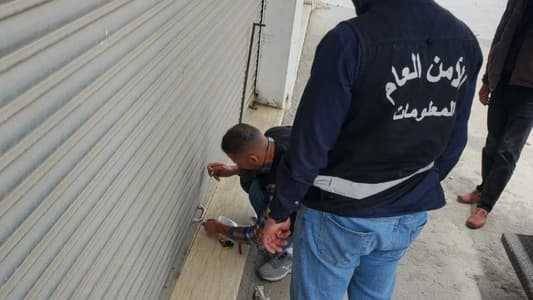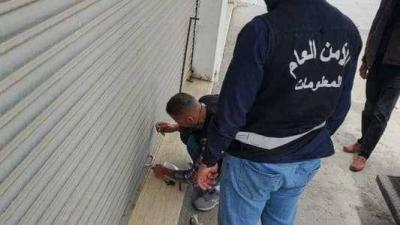With the explosion of the Syrian refugee issue in Lebanon following the assassination of the military leader Pascal Suleiman, a series of parliamentary movements and actions have been directed towards Prime Minister Najib Mikati and Interior Minister Bassam al-Mawlawi. The billion-dollar aid has further heated the discussions, gaining a parliamentary dimension through a special session set for next Wednesday. Concurrently, campaigns by the General Security have begun in various regions to implement the law and decisions issued by the Ministry of Interior. A notable political observation is that Christian parties have started to collaborate to organize the Syrian presence in their areas, leading to a displacement of large Syrian populations towards Sunni areas, where the stance remains ambiguous and municipalities have stalled in taking necessary actions to begin applying minimal organization for Syrians, especially in the north.
To keep up with what is happening in the north, "Nidaa al-Watan" learned from a source in General Security about the steps being taken to enforce the law regarding Syrians present illegally. It was reported that patrols from the Information Branch of the National Security Directorate of General Security are active in all Lebanese regions, checking the residency of Syrians managing shops and institutions. If it is confirmed that they do not possess first-category work permits, their documents are seized, and the competent judiciary is contacted, sealing shops and institutions with red wax. If a Syrian presents no document proving their identity, they are detained for eventual deportation. If any document is shown, even if it violates residency regulations, a receipt is given for them to process their residency at the General Security Directorate, provided they obtain a first-category residency and work permit due to managing a shop.
The source added: Syrians managing a shop or institution will not be deported unless they do not present any official document. Once an irregular Syrian is removed from the shop, the Lebanese owner may refer to the public prosecution to obtain permission to reopen, on the condition of committing not to employ any illegal Syrians unless they secure first-category residency and work permits.
Regarding new procedures taken by General Security to enforce the law concerning illegal Syrians, the source stated: Any Syrian who illegally enters Lebanon without any identification is immediately deported. Meanwhile, Syrians with expired residencies are informed of the necessity to regularize their status immediately under penalty of deportation.
**Significant Pressure on the North: Where Are the Municipalities?**
The General Directorate of General Security is under immense pressure from the influx of Syrian refugees arriving from outside the north towards northern regions, compared to the number and ability of the Directorate to control the large density of Syrian refugees coming to the north. This necessitates that all northern municipalities work seriously and immediately in collaboration with General Security to organize lists of names and numbers of Syrian refugees entering their municipalities.
The source in General Security pointed out that the movement of large numbers of Syrians from Beirut, Metn, and Mount Lebanon to the north is due to four factors:
1. The political and public fallout following the Pascal Suleiman crime.
2. The northern Sunni environment is closest to the Syrian refugees’ environment, and since the border with Syria is relatively uncontrolled, a Syrian can return to their country and come back whenever they wish.
3. The battles in southern Lebanon and the fear of escalating confrontations.
4. The daily wage for an ordinary Syrian worker in the north is generally no less than $20, which is a significant amount compared to the deteriorating economic situation in Syria, allowing them to support themselves and their families comfortably. If a Syrian is deported to their country, they won’t be able to Earn this amount there, which leads to the return of almost all who were deported back to the north.
As a result, the number of Syrian refugees is rising almost daily, and there is no ability to regulate their numbers even approximately, creating a burden, especially on the northern Sunni Lebanese landscape.
**Lebanese Cover for Syrian Violations**
The source noted that Lebanese property owners are covering for Syrians managing businesses in their properties for financial benefits, with some Lebanese organizing false rental contracts to shield the violating Syrian. However, General Security's Information patrols overcome this legal circumvention and proceed to seal the shop since the Syrian is effectively in charge. It was observed through these patrols that over 80% of Syrians have expired residencies or are under travel bans or illegally entered the country, with only 20% holding legitimate residency or responsibility agreements registered with the UN.
Another important observation is that the financial situation of Syrians managing shops and businesses is more than good, as they can organize first-category work permits and residencies without concern for financial costs. Syrians engage in an economic cycle among themselves, selling and buying, and rarely do Lebanese benefit from it. Moreover, matters have reached the point where Syrians control some critical areas, such as the new vegetable market, where they impose higher prices on Lebanese while enjoying lower prices themselves, resulting in the collapse of competition in favor of Syrian sellers in Tripoli.
An additional challenge faced by General Security is the interventions, mediations, and attempts at bribery faced by Director-General Elias Beissari, who has instructed all officers and members of the agency to refuse any interference in their work to implement the law on Syrians in Lebanon, according to "Nidaa al-Watan."
General Security measures alone are insufficient to address the rampant chaos in the Sunni areas, particularly because some view the issue through a lens of bias based on a false sense of Sunni unity between northern Muslims and Syrians, which reflects on the positions of MPs and municipalities, while many have resolved their issues with the Syrian regime and focused on establishing a limited economic cycle among themselves and the interior of Syria. The first steps toward a solution are achieving the correct national social awareness regarding what should be done based on law and justice, allowing the few pursued by the regime to return immediately to Syria.




